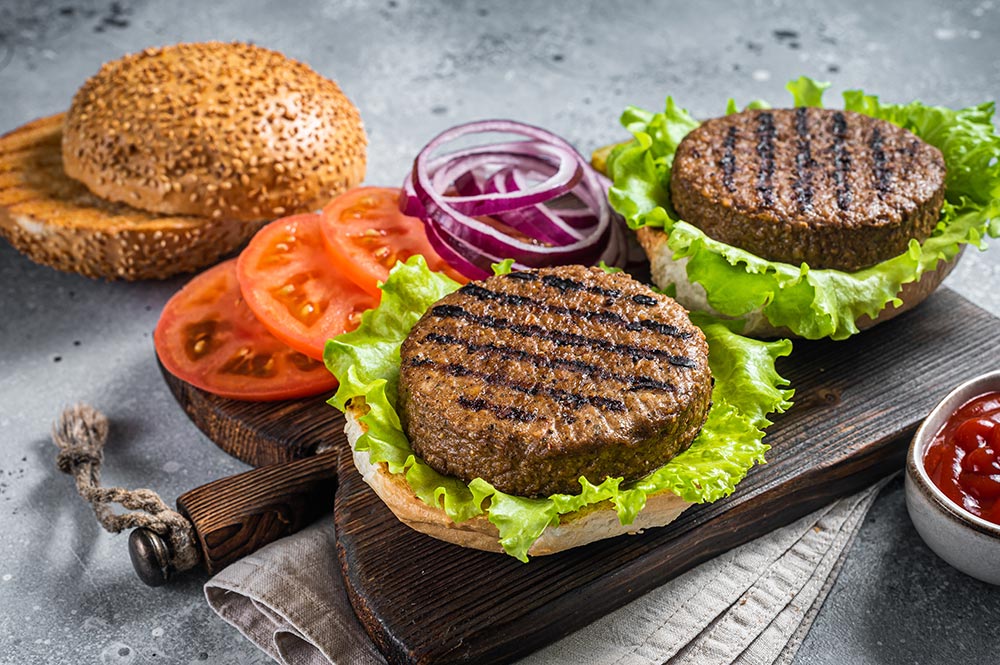
Article

Turns out you don’t need to stick to whole foods to tip the scales! Research has found that replacing animal products with low-fat plant-based foods (even processed ones) can be highly effective for weight loss.
For anyone interested in following a vegan diet to maintain a healthy weight, the chatter around ultra-processed foods can be confusing at best, terrifying at worst 😅
After all, some plant-based foods we intuitively know to be health-promoting and nutritious – like tofu, canned veggies, and beans (c’mon, beans?!) – are technically classed as ‘processed’ foods.
Other popular vegan staples, such as plant-based meats, are even considered ‘ultra-processed’, even though science has already confirmed they have a healthier nutritional profile and are better for heart health than conventional animal meat.
So if you’re trying to drop a few kilos, what’s the deal? Conventional weight loss wisdom would suggest that most (if not all) processed foods should be off the menu, but does the same go for plant-based alternatives?
Thankfully, the research is serving up some reassuring results…

That’s right: recent research by the Physicians Committee for Responsible Medicine (PCRM) has confirmed that a low-fat plant-based diet doesn’t need to comprise 100% whole foods to be seriously effective for losing weight.
Filling your plate with plant-based foods – even if they are considered ultra-processed like soy milk, vegan meat, and yoghurt alternatives – instead of animal products can positively impact your weight and overall health.
Now that’s a load off when trying to plan healthy meals! This crucial clarification means that plant-based milks, meat alternatives, tempeh, tofu, vegan yoghurts, canned beans, bread, pasta, and even dairy-free cheeses are all still on the table for anyone looking to manage their weight, even though many of these foods technically fall under the ‘processed’ or ‘ultra-processed’ banner.
“Our research shows that choosing a bagel instead of bacon for breakfast – or a veggie burger instead of a hamburger for dinner – is the best option if you are looking to lose weight,” says Dr. Hana Kahleova, Director of Clinical Research at PCRM.
“The key to success is replacing all animal products with plant-based foods – whether unprocessed fruits and veggies or ultra-processed cereal, plant milks, and meat alternatives.”
At a time when ultra-processed foods are under increasing scrutiny for contributing to chronic disease and obesity, this latest insight suggests the conversation requires more nuance regarding plant-based options.

This new research is a secondary analysis of a study that examined overweight people living with type 1 diabetes who switched to a vegan diet. The clinical trial saw participants split into two groups: a control group that made no changes to their eating habits and an intervention group that followed a low-fat, plant-based diet.
All foods the participants ate were tracked and categorised according to the NOVA system, which assigns foods to categories according to their level of processing. (Category 1 = unprocessed or minimally processed foods; Category 2 = processed ingredients; Category 3 = processed foods; and Category 4 = ultra-processed foods.)
The results were striking. While the control group saw no significant change in their weight throughout the 16-week study, participants who switched to plant-based foods lost nearly 6kg, whether or not their diet included some processed and ultra-processed items.
There were no calorie restrictions, rules about processed food, or hectic gym routines – they simply swapped meat and dairy for plant-based alternatives.
“Our new study is an important reminder that plant-based foods that are considered processed, like canned beans, cereal, and veggie burgers, are actually part of a healthy diet that can help fight… diet-related chronic disease epidemics,” says Dr. Kahleova.

We hate to say it, but… it’s complicated. Because the classification system is so oversimplified, ‘processed’ and ‘ultra-processed’ labels aren’t actually all that helpful for identifying a particular food’s health impacts.
With these catch-all labels missing crucial nuance, experts say the best thing to do is check the nutritional info on the packaging instead.
“It’s important to look at what’s actually in the ultra-processed foods,” says Paul Behrens, a food systems expert at the University of Oxford. “Of course, we should aim for delicious, whole-food, plant-based meals as the core of our diet, but ultra-processed plant-based foods generally have much better nutrition scores than ultra-processed meat foods.”

Some ultra-processed vegan foods – like pastries, chips, cakes, and cookies – can be considered unhealthy if they contain high amounts of salt, sugar, or saturated fat, and have a low nutritional value. Still, not all ultra-processed foods are created equal.
Sometimes, simply fortifying an otherwise healthy food with extra nutrients can result in it being slapped with the ‘processed’ label, as is the case for some plant milks that contain added vitamin D, calcium, or vitamin B12.
Science has also found that plant-based meats tend to be healthier than their animal-based counterparts because they contain less saturated fat, no cholesterol, and much more fibre.
A good rule of thumb is to favour products with a Health Star Rating of 3.5 or above, low in sodium (120 to 400mg sodium per 100g), and high in fibre (4g of fibre or more per 100g).
Whether you’re plant-curious, vegan-ish, or already entirely herbivorous, what does this whole ‘processed’ and ‘ultra-processed’ foods debate actually mean for you? Well, these latest findings are a reminder that:
🌿 You don’t need to follow an entirely whole-foods diet to see significant health benefits and improve your wellbeing.
🌿 Cutting back on meat and dairy in favour of plant-based foods (even the processed kind) can be a powerful choice if you’re looking to make positive changes to your lifestyle.
🌿 Not all processed and ultra-processed foods are made equal, especially when it comes to plant-based alternatives, so checking nutritional labels is crucial.
🌿 Switching to a more veg-centric diet is proven for weight loss, even if you include some processed foods like plant-based milks, vegan yoghurts, meat alternatives, and dairy-free cheeses.
To state the obvious, a whole-foods, plant-based diet is still considered the gold standard for optimal health.
While even ‘ultra-processed’ vegan foods can help you lose weight when you choose them instead of heavier animal-based foods, relying on them too much might not be the long-term win we’re after. It’s all about balance and moderation.

So, for the best results – we’re talking increased energy, easier digestion, better sleep, and all that good stuff – centre your diet around whole grains, legumes, fruits, and veggies, while treating some of those more highly processed options (like plant-based meats and cheeses) as occasional additions rather than staples.
And hey, why not toss a vegan ice cream into the mix for good measure? Just maybe not every night – but remember to treat yourself! ![]()
Important note: It’s always best to chat with your GP before changing your eating habits. A shift towards a plant-based diet can offer many benefits, and guidance from a healthcare professional can help you tailor it to best support your individual needs. Check out this database of plant-friendly doctors and dietitians who can help support you on your journey to healthier eating. ![]()
Ready to take the first step towards better wellbeing and discover how easy (and satisfying) healthy plant-based meals can be? Grab a free Veg Starter Kit today for all the tips you need to get started.

Having grown up in a “meat and 3 veg” kind of household, Liv’s embarrassed to admit that she was a bit of a one-note chef until she began exploring the world of plant-based food. Vegan cooking has given her a whole new appreciation for the symphonies of flavours that simple, nourishing wholefood ingredients can create. (Even eggplant, once her greatest nemesis, is now — in a delicious, miso-glazed redemption arc — her all-time favourite veg.)